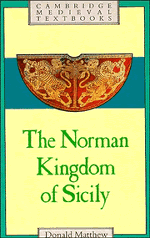Book contents
- Frontmatter
- Contents
- List of abbreviations
- Note on coinage
- Map of Sicily and Southern Italy
- Acknowledgements
- Introduction
- Part I The Normans and the monarchy
- Part II The kingdom
- Part III The monarchy
- Part IV The Norman legacy
- 10 The kingdom in disarray
- 11 The kingdom revitalised
- 12 The kingdom betrayed
- Further reading
- Index
- Cambridge Medieval Textbooks
10 - The kingdom in disarray
Published online by Cambridge University Press: 05 June 2012
- Frontmatter
- Contents
- List of abbreviations
- Note on coinage
- Map of Sicily and Southern Italy
- Acknowledgements
- Introduction
- Part I The Normans and the monarchy
- Part II The kingdom
- Part III The monarchy
- Part IV The Norman legacy
- 10 The kingdom in disarray
- 11 The kingdom revitalised
- 12 The kingdom betrayed
- Further reading
- Index
- Cambridge Medieval Textbooks
Summary
The death of William II without direct heirs on 17 November 1189 opened a long period of difficulties for the kingdom. Its immediate effect on the government of the country can be directly illustrated from the Carpineto chronicle's account of the monastery's protracted lawsuit with Richard de Padula. On Christmas Eve, he simply occupied the lands of his great-grandfather, which he had been trying to recover by law, and sealed his victory by sending Abbot Bohemond back to his home monastery of Casauria as an alleged simoniac. Since Richard had the backing of Roger, count of Teramo, who had sworn allegiance to the emperor, the monks of Carpineto sent a representative to Lombardy to get the imperial marshal, Henry Testa de Bappenheim, to put pressure on the count. For practical purposes, the authority of the Sicilian monarchy counted for nothing on its northern borders. The eagerness of certain groups to take advantage of the hiatus in government was shown also at Naples, where the citizens seized properties taken from them by the men of Aversa. In both Naples and Amalfi, the citizens established communes for self-government. Although this time the whole kingdom was not ready to break up into fragments, there is no doubt about the eagerness of some groups to take advantage of the opportunity to get their own way. How all the different parts of the kingdom fared remains obscure, for the sources of information available are themselves scanty and discontinuous, but over the next generation, recurrent uncertainty about the future encouraged much dissent and unrest.
- Type
- Chapter
- Information
- The Norman Kingdom of Sicily , pp. 285 - 314Publisher: Cambridge University PressPrint publication year: 1992

